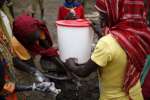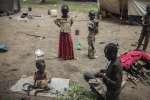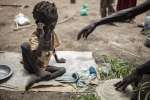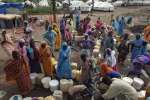More than 100,000 refugees vaccinated against cholera in Tanzania
News Stories, 26 June 2015
NYARUGUSU REFUGEE CAMP, Tanzania, June 26 (UNHCR) – More than 100,000 refugees have been vaccinated against cholera in a major initiative to prevent a repeat outbreak of the epidemic which killed 31 people last month in northwestern Tanzania.
Twenty five temporary vaccination sites were set up in Nyarugusu camp, northwestern Tanzania, to conduct the exercise from June 20-23. The campaign targeted the entire camp population of 120,000 refugees, mainly from Burundi and Democratic Republic of Congo.
Of that number, 106,621 individuals, over the age of one, were vaccinated -- a coverage rate of 93 per cent.
Dr Sofia Rizo of MSF Switzerland said: "We targeted all refugees and other individuals residing in the camp before the start of the campaign mainly through community mobilizers who educated the population on cholera and the importance of the vaccine."
She said Muslims taking part in the Holy Month of Ramadan were vaccinated after 1900 hours every evening.
Last month's cholera epidemic in Tanzania's lakeside Kagunga area added to other serious challenges created by the forced population displacement from Burundi.
UNHCR and its partners responded by stepping up preventive water and sanitation measures and evacuated the refugees by boat to Kigoma and eventually to Nyarugusu refugee camp.
Cholera is transmitted through drinking contaminated water. The overcrowded and unsanitary situation in Kagunga and consumption of water from the lake was believed to be the cause of that outbreak.
Siyajali Violete, a 20-year-old Burundian refugee, who arrived in Kagunga in mid-May recognized the importance of the vaccine.
"We were told that taking the vaccine will help to stop cholera in the camp and will prevent people from dying" she said. "We received this information through refugee community mobilizers using megaphones, who told us about the importance of personal hygiene, washing our hands and keeping the environment clean."
In July, the second round of the vaccination campaign will get underway in the camp as part of a combined effort by UNHCR and its partners including the government to eradicate the virus among refugees over the next two years.
"We are delighted that the vaccination campaign has covered nearly all the refugees in the camp and we are very grateful to all partners including the government, WHO, UNICEF and MSF for their efforts to make the first round of the campaign a success," said Dr. Ahmed Ibrahim, UNHCR Public Health Officer.
In addition to the vaccination campaign, Dr. Ahmed believes that strengthening surveillance and early warning mechanisms will greatly help to detect any possible cases for immediate treatment.
"We will continue to work with the government, our health partners, MSF and Tanzania Red Cross in maintaining prevention and control measures and reminding the community of basic hygiene behavior, regular hand-washing during preparation of food and before handling food for eating," he added.
By Tom Winston Monboe



























































